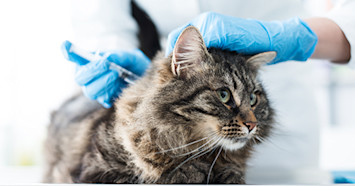
Feline distemper, also known as feline panleukopenia, is caused by an extremely contagious and potentially fatal virus called feline parvovirus (FPV). Feline parvovirus is different than canine parvovirus and only causes disease in cats. Feline distemper is spread through any type of body fluid but most commonly by accidental ingestions of feces. Litterboxes, food bowls, and bedding of infected cats all have potential to infect healthy cats.
Distemper in cats causes gastrointestinal, immune system, and reproductive disease. Symptoms can include poor appetite, loose stool, vomiting, stomach pain, pale skin and gums, or bruising. Very young kittens may become sick and pass away so quickly that symptoms never become obvious. This can occur in as little as 12 hours. If a kitten is infected as a fetus, he or she may show unusual neurological symptoms such as tremors, trouble walking, or seizures after birth. Adult cats that become infected while pregnant may experience miscarriages or stillbirths.
No cure currently exists for feline distemper. However, two types of vaccines are available. Both are extremely effective in preventing distemper infections in cats if used and boostered properly.
Feline Distemper Vaccine
Feline distemper vaccine (feline distemper shot) is manufactured as a modified live virus vaccine or a killed adjuvant vaccine. Both are effective, although the modified live version works more quickly. Most distemper vaccines are combined with other types of vaccines in the same vial to allow for fewer injections. FVRCP is a common such combination vaccine which includes feline viral rhinotracheitis, calicivirus, and panleukopenia (i.e. feline distemper or feline parvovirus). FVRCP vaccines may also be called 3-in-1 vaccines or 3-way vaccines.
Do indoor cats need distemper shots?
The American Association of Feline Practitioners (AAFP) considers the distemper vaccine a core or necessary vaccine for all cats. This is probably because of how severe the infection is and how easily contagious it can be. Feline distemper can hang around the environment for a long time and can be easily carried from one place to another such as on your shoes or clothing.
AAFP’s recommendation is to begin vaccinating a kitten for distemper as early as six weeks of age, boostering or repeating the vaccine every three to four weeks until the kitten is sixteen weeks of age, then boostering again one year from the last booster. After that, an adult cat should be boostered for distemper every one to three years. If the kitten series of boosters is missed, the cat needs two distemper vaccines, three to four weeks apart, then another booster one year later. Continue boostering every one to three years for the rest of the cat’s life.
Feline Distemper Vaccine Side Effects
For the most part, distemper vaccines are very safe. Modified live vaccines should not be used in pregnant cats because it can cause neurologic birth defects, such as those that occur with the real version of the virus.
Uncommon side effects of either vaccine include pain or swelling at the injection site. Cats may hide for one to two days if they are uncomfortable or stressed from the veterinary visit.
Another side effect of distemper vaccination is a vaccine reaction. Vaccine reactions in cats are rare. Symptoms of a reaction include red splotches or hives on the belly or swelling of the face. If you notice these symptoms, call your veterinarian immediately as vaccine reactions can be life threatening.
Injection site sarcomas are a type of cancer than can occasionally occur with any vaccine. Current research is unclear as to whether one type of vaccine is safer than another. Some veterinarians will give vaccines in specific places on lower parts of the legs in order to protect major organs should injection site sarcomas occur. Spreading out the vaccines to every three years instead of yearly, especially in lower risk areas, can also help prevent sarcomas – research is showing that the distemper vaccine is often effective for at least three years and little need exists for yearly distemper shots. This is not the case for all types of vaccines though. Be sure to discuss any and all concerns about types and frequency of distemper vaccines with your veterinarian in order to help you make an informed decision.